 In the bleachers, you're child sees you as their biggest fan and cheerleader. But before the season ever starts, you have another important sports-related role: safety monitor.
In the bleachers, you're child sees you as their biggest fan and cheerleader. But before the season ever starts, you have another important sports-related role: safety monitor.
Sports injuries are a common safety concern for school age athletes. Concussions, which affect tens of thousands of kids in the U.S. each year, are among the most serious. These brain injuries can be especially dangerous -even deadly- if a second concussion occurs before the first one has had enough time to heal.
Fortunately, you can take the lead in reducing the risk of concussions. The Centers for Disease Control and Prevention offers these four tips:
1. Verify that your child's school, league or district has a concussion policy. It's important to make sure coaches know how to recognize and deal with these injuries, which include working with a healthcare professional to determine when it's safe for athletes to return to play.
2. Emphasize to your child the importance of following the rules of the game and the coach's rules for safety.
3. Encourage your child to practice good sportsmanship.
4. Make sure your child wears appropriate protective equipment. Helmets are a must for riding activities, such as cycling or skateboarding, or collision sports, like football or ice hockey. They help reduce the risk of a serious brain injury or skull fractures. Be aware, however, that helmets are not designed to prevent concussions. That's why your child needs to avoid hits to the head as much as possible.
Athletes who sustain a concussion may not realize it or may insist they're fine. So it's important to watch for signs and symptoms that may mean a concussion.
Possible symptoms your child might report include:
• Headache.
• Nausea or vomiting.
• Balance or vision problems.
• Sensitivity to light or noise.
Signs you might recognize in your child include:
• Dazed appearance.
• Confusion or forgetfulness.
• Clumsy movement.
• Slow response when asked questions.
• Change in mood, behavior or personality.
• Loss of consciousness.
If you think your child might have a concussion, get medical help. Doctors can evaluate your child and determine what the next steps should be.
Watson Clinic’s Sports Medicine department is the ideal destination of choice for physically active people of all ages who want to remain safe and protected from injury while performing at their maximum. We work closely with a variety of the region’s top high school sports teams to conduct annual physicals, injury prevention, assessment and treatment, and we often supervise play from the sidelines. Call 863-680-7214 for more information or to schedule an appointment.